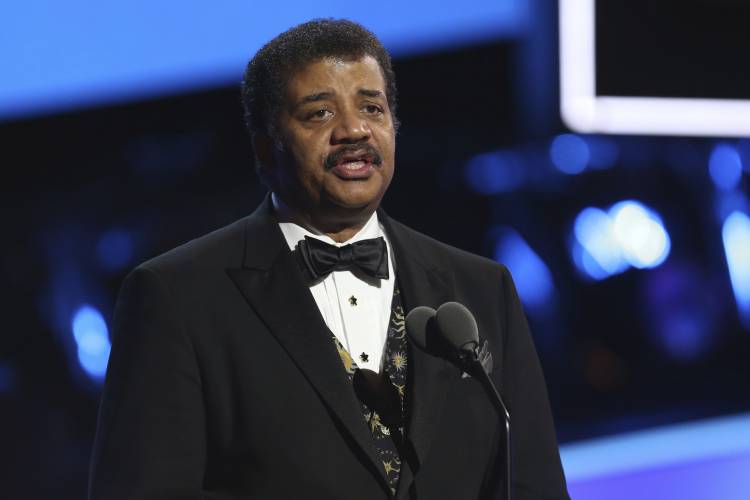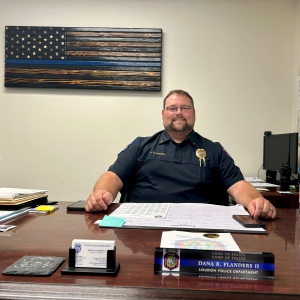Opinion: In today’s world, being right is not enough

Neil deGrasse Tyson speaks at the 60th annual Grammy Awards at Madison Square Garden on Sunday, Jan. 28, 2018, in New York. (Photo by Matt Sayles/Invision/AP) Matt Sayles
| Published: 01-20-2024 7:00 AM |
Charles Huckelbury lives in Henniker.
The 2024 election season has begun, and the Democrats appear to have finally learned that the polarized electorate cannot be swayed by simple slogans and Trump’s obvious defects. President Biden’s first campaign speech near Valley Forge provided a glimpse of the formidable factual arsenal he has at his command. This is especially impressive when compared to the empty rhetoric and arrant lies coming from the other side of the aisle. Even a GOP stalwart like Chris Christie threw up his hands in disgust and quit the race.
Objective truth is, however, an insufficient guarantee of victory in November. The solution to this dilemma comes, from all places, from an eminent astrophysicist.
During a discussion on scientific communication, Neil deGrasse Tyson offered a cogent piece of advice he had heard from his father: it is not enough to be right. Yes, under normal circumstances and in earlier years, truth was a powerful weapon. People depended, perhaps a bit too naively, on their leaders for honesty in order to assess their options when they entered the voting booth. Recall Lyndon Johnson and the Pentagon Papers. Voters dared question any proposition that seemed to defy logic or common sense, like drinking bleach for medicinal purposes or building an aircraft that is invisible to the human eye. In today’s world, being right is clearly not enough. As Dr. Tyson reminds us, being effective at communicating the truth is just as important.
And that is where knowing one’s audience is the key. Yes, the November elections will occur on a national stage, but candidates must convince voters in both Tallahassee and Chicago of their grasp of the truth and backed up by irrefutable knowledge. Having objective truth and not “alternative facts” to present to the public still requires an effective vehicle to deliver it to the men and women who will decide the country’s fate. No small feat when you consider that nearly a quarter of the population in the U.S. doesn’t know that the Earth orbits the Sun.
If we pick a subject on which people disagree, moving opinion is not exclusively a matter of producing supporting data. The normal chain, again courtesy of Dr. Tyson, begins with data, which becomes information, which is followed by knowledge. Persuasion will always fail if frustration leads to name-calling and the assumption that the other person has a room-temperature IQ.
The president’s speech was an excellent start but only a start. He presented data to support his administration’s attention to the needs of the typical American family, and he followed that with explanations of each policy (information). The clear intent was that his audience, regardless of party affiliation, should come away with an increased knowledge of the accomplishments of his first term and the plans for the second. This strategy should be applied in every venue, so that voters will carry that knowledge with them as they go to the polls in November.
At a glance, it appears that the Democrats should have an easy task of keeping the White House and the Senate and regaining the House. The GOP has yet to produce any valid data that contradicts what the president articulated at Valley Forge.
Article continues after...
Yesterday's Most Read Articles
 ‘Would you raise your right hand?’ — Local veterans consider the meaning of Memorial Day
‘Would you raise your right hand?’ — Local veterans consider the meaning of Memorial Day
 New Hampshire school phone ban could be among strictest in the country
New Hampshire school phone ban could be among strictest in the country
 Jesse Sullivan pleads guilty to second-degree murder of half-brother, Zackary
Jesse Sullivan pleads guilty to second-degree murder of half-brother, Zackary
 Loudon police received a mental health call. Here’s how they avoided escalating it.
Loudon police received a mental health call. Here’s how they avoided escalating it.
 Photos: Memorial Day parade in Concord
Photos: Memorial Day parade in Concord
 Opinion: Hopkinton students speak out on youth sports and poverty
Opinion: Hopkinton students speak out on youth sports and poverty
We are eleven months away from the election, time enough for attitudes and votes to oscillate before coming to rest on a specific candidate. It therefore seems prudent to keep in mind Dr. Tyson’s warning: being right is not enough, either to persuade a resistant audience or, in the present case, to guarantee the survival of our democracy.







 Opinion: How dark can it get?
Opinion: How dark can it get? Opinion: Unfair taxes, unfair schools: The New Hampshire way
Opinion: Unfair taxes, unfair schools: The New Hampshire way Opinion: In the fight to stop sexual violence, can polio hold the solutions?
Opinion: In the fight to stop sexual violence, can polio hold the solutions? Opinion: Where are the permanent solutions for a more stable budget?
Opinion: Where are the permanent solutions for a more stable budget?
